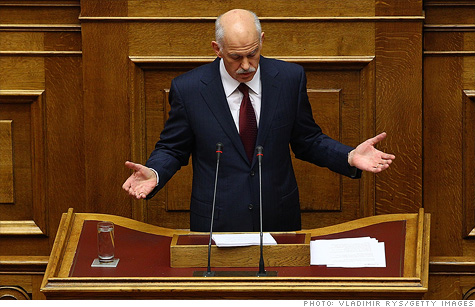
Greek Prime Minister George Papandreou survived a confidence vote and called for a coalition government.
ATHENS, Greece (CNN) -- Greek Prime Minister George Papandreou won a confidence vote in Parliament by a narrow margin, giving his country's stricken economy some breathing room, but no panacea.
The 153-145 vote victory came minutes after Papandreou announced that he will seek a coalition government, though it was not immediately clear whether he would lead it.
"Tomorrow, I will go see the president and inform him that I am willing to hold talks with other parties in order to form a coalition government," the prime minister said late Friday in a speech to Parliament.
Papandreou said it would be disastrous if elections were to be held immediately, because that would leave "up in the air" a controversial bailout deal that was brokered October 27.
It would exact tough austerity measures on the Greek people and their government.
Under a motion of confidence, lawmakers signal to the head of state whether the government has the support of parliament. A loss typically results in the government's dissolution and the holding of a general election unless the head of state asks someone with more support to form a government.
As he had done on Thursday night, Papandreou pushed for approval of the international bailout package that the country has been offered, calling it "a huge change, and perhaps the last one, to rebuild a country with new and strong foundations."
Papandreou reiterated that he has no great desire to maintain his grip on power. "The last thing I care for is the chair," he said. "I don't care if I never get elected again."
He defended his leadership, accusing previous governments of miring the Greek economy in debt. "Those days, you could borrow money easily, and now that's why the Greek people have to pay back for it," he said.
Papandreou said he now wants "to turn the page over and move forward." But opposition leader Antonis Samaras has made clear that he is not ready to turn the page, calling for a transitional government for six weeks, followed by elections.
Papandreou declared that such a course would prove "simply catastrophic. "If we go straight away to elections, we won't be able to implement a bailout," he said.
The deal brokered on October 27 would wipe out €100 billion in Greek debt, half of what it owes. It comes with a promise of €30 billion from the public sector to help pay off some of the remaining debts, making the whole deal worth €130 billion ($178 billion).
But the package comes with strings that would require Greece to slash government jobs, privatize some businesses and reduce pensions.
The narrow victory is expected to mean that Greece will get its next installment of money from a separate international agreement brokered in May 2010, allowing it to pay its bills next month and avoid immediate default.
That €8 billion payment had been threatened when Papandreou announced earlier this week that he would take the bailout package to the Greek people through a national referendum, a move he retracted Thursday.
The vote of confidence did nothing to eliminate the specter of looming economic disaster that has dogged the debt-ridden country and sent shock waves through international markets.
Though Greece ranks 32nd in terms of gross domestic product, experts say it wields a disproportionate influence on world markets; economists fret that a Greek default could drag down larger European economies, like those of Portugal, Spain, Ireland and Italy.
"It's not over," said Heather Conley, director of the Center for Strategic International Studies' Europe Program, about the crisis. "We're buying time in nearly daily increments. It doesn't change the fact that this is a fourth year of a Greek recession, and they have missed nearly all their austerity targets."
The real solution would be to redefine the eurozone and the European Union, creating a transfer of wealth from north to south, she said, adding "That's not going to happen."
Meanwhile, the country is pursuing two strategies -- trying to buy time for Greece to fix its economy and trying to prevent contagion. That may not be easy. "Today, the yields on 10-year Italian bonds are at the highest they have ever been," she said. "That's unsustainable."
-- CNN's Elinda Labropoulou and Jim Boulden in Athens, Ali Velshi in Cannes, Matthew Chance in Rome, and Laura Smith-Spark in London contributed to this report. ![]()
| Overnight Avg Rate | Latest | Change | Last Week |
|---|---|---|---|
| 30 yr fixed | 3.80% | 3.88% | |
| 15 yr fixed | 3.20% | 3.23% | |
| 5/1 ARM | 3.84% | 3.88% | |
| 30 yr refi | 3.82% | 3.93% | |
| 15 yr refi | 3.20% | 3.23% |
Today's featured rates: